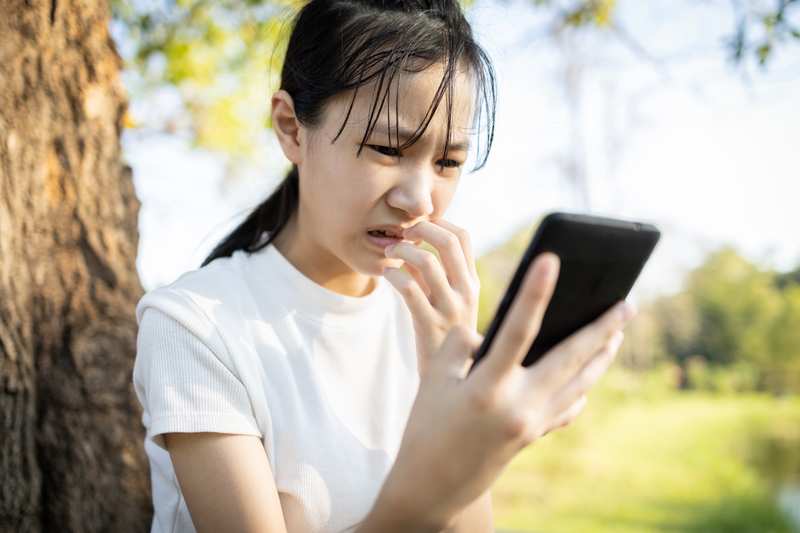Women and girls experience a broad range of harms through online platforms. The online environment makes it easier for perpetrators of online violence against women (OVAWG) to harass, stalk and abuse victims, as it allows for a global reach, online anonymity, and provides an outlet for misogynistic views. Technology is often utilised to negate typical physical boundaries of offline violence and a single act can spread across large geographic areas while impacting more than one victim at a time.
The Cyber Armour is a podcast series developed by the Law and Policy stream of the Centre for Protecting Women Online at The Open University. It is a podcast which champions the voices and safety of women and girls in the digital world. It explores different topics in relation to online safety, while aiming to appeal to a non-academic, general audience that may not have many opportunities to deepen their understanding of these issues.
The Centre for Protecting Women Online is a vehicle for understanding and addressing challenges posed to women’s online safety through a novel, interdisciplinary and ambitious research agenda. It develops cross-sectoral, collaborative outputs and interventions which inform law, policy, technology development and practice to reduce online harms suffered by women and girls, and to minimise anti-social behaviours online while promoting pro-social behaviours and help build tech/software that helps ensure accountability, credibility and helps facilitate justice.
The Centre is comprised of five interwoven work streams:
- Law and Policy
- Human Behaviour
- The Future of Responsible Tech
- Ethical and Responsible Tech/AI
- Policing.
Additionally, the Centre has partnered with numerous organisations to help achieve its core objectives.

The need for a podcast on online harms affecting women
Despite the prevalence of online harms in recent years and a steady increase in law and policy responses to this phenomenon (e.g. Online Safety Act 2023; EU AI Act 2024; EU Digital Services Act 2022), there is still a limited understanding of their full spectrum and impact.
The Four Nation Study, conducted by Professor Olga Jurasz, examined the scale, impact and societal attitudes towards online violence against women and girls (OVAWG) across the UK. It found that 1 in 4 women in England experience OVAWG and 1 in 3 LGBTQ+ women experience online violence. Similarly, in Scotland 1 in 3 young women (aged under 34) experienced OVAWG, while 1 in 2 LGBTQ+ identifying women in Scotland had experienced OVAWG. Most of the incidents surveyed were of text-based abuse and were sexually explicit. In Wales, 1 in 3 young women experienced online violence, and 1 in 3 LGBTQ+ identifying women had experienced online violence. Young women also more commonly experience sexually explicit online violence. In Northern Ireland only 12 per cent of women experienced online violence, however, young women and LGBTQ+ people were more likely to be affected by it. This study found that in the United Kingdom, across the four nations, 1 in 10 women (15 per cent) have experienced online violence, while 3 in 10 women (30 per cent) have witnessed online violence.

A lack of knowledge on different harms and how to report them can negatively affect prevention of, and effective response to, online harms and hinders access to justice for its victims. This is particularly the case with online harms experienced by women which are often narrowly understood to include sexual harms and largely exclude other types of harms – e.g. text-based abuse, online harassment, financial harms and cyberstalking. Such approach is not only misguided and not reflective of lived experiences of women online but results in fragmented, incoherent responses which do little to i) change the behaviours which lead to online harms; ii) change the design of tech/software which enables online harms and iii) provide effective law and policy responses which help the victims.
The Cyber Armour podcast was developed to increase awareness and understanding of online harms affecting women and girls. The pre-recorded episodes explore a wide range of concerns that are affecting women and girls in our society today such as deepfakes, harms of online dating, how parents can keep their young girls safe online and misogynoir, misogynistic content affecting Black women.
Episode 1: The risks and harms of online dating
In this episode Dr Ksenia Bakina interviewed Dr Emma Turley, Senior Lecturer in Criminology from Central Queensland University, Australia. Emma’s work draws on psychology, criminology and gender studies and is interested in understanding the challenges faced by women and LGBTQ+ people, particularly in the realm of online abuse and digital harms. Her research dives deep into issues around sexualities, gender and social justice. She is also the co-editor of the British Psychological Society’s periodical the Psychology of Women & Equalities Review, which examines themes of gender, sexuality, inequalities and feminism, and is published twice a year.
This episode addresses the risks and harms that women experience while dating online. It also explores what safety tips work, how to safeguard your privacy while using dating apps and what safety app features online dating platforms should employ. Emma also explained why a creation of short videos about the risks and harms of online dating was most effective in delivering messages about dating app safety. The videos that were created by Emma and her colleagues (Dr Nichola Corbett-Jarvis and Dr Jan Cattoni) can be found here.
Episode 2: Infrastructural justice: developing safer technologies
This episode featured two guests, Professor Arosha Bandara and Dr Sarah Robinson. Arosha is a Professor of Software Engineering at The Open University and a Stream Lead for the Future of Responsible Tech at the Centre for Protecting Women Online. He has led research on adaptive systems as a PI and Co-I on multiple projects funded by the EPSRC, ERC and Qatar National Research Foundation, working in application domains including healthcare and policing. He is a member of the steering group for the OU’s Centre for Policing Research and Learning and is currently Associate Dean and Director of STEM Research. Sarah is an Applied Psychologist at the People and Technology Group, School of Applied Psychology, UCC, and Lero, Science Foundation Ireland’s Research Centre for Software. Her work contributes to understandings of responsibility, justice and care across a number of contexts including software engineering.
This podcast episode discusses responsible software engineering and why it is important. Further we explore the idea of infrastructural justice, what this means in practice and how it might help to address online harms experienced by women. The podcast discusses what needs to be done in practice to ensure that a safer software is developed that can tackle OVAWG.
Episode 3: Deepfakes
This episode features three guests from the Centre for Protecting Women Online to address the global phenomenon of deepfakes, Professor Arosha Bandara (please see the description in episode 2, above), Professor Lisa Lazard and Professor Rose Capdevila. Lisa is a Professor of Psychology and stream co-lead (Human Behaviour) for the Centre. Her research focuses on gender and how gendered identifications become located within relations of power. She is currently also Project Lead on the Gender Equitable Interactions Online (GEiO) – a four nation European funded project. She is the author of ‘Sexual Harassment, Psychology and Feminism’ (2020). She has been editor of Psychology of Women and Equalities Review (POWER) and past chair of the Psychology of Women & Equalities Section of the British Psychological Society.
Rose is a Professor of Psychology and stream co-lead (Human Behaviour) for the Centre. Her research focuses on gender and digital spaces. She was an international collaborator for the European funded SeGReVUni project on gender related violence in universities. She is currently also co-investigator on the Gender Equitable Interactions Online (GEiO) – a four nation European funded project. Rose co-edits the book series Feminist Companions to Psychology and is co-editor of the award-winning Handbook of International Feminisms: Perspectives on Psychology, Women, Culture, and Rights (2011) and Palgrave Handbook of Power, Gender, and Psychology (2023). She has been co-editor of the journal Feminism & Psychology and past chair of the Psychology of Women & Equalities Section of the British Psychological Society.
This episode explored the phenomenon of deepfakes and the prominence of deepfakes online, as well as the harms that they cause to individuals and society. Further, this podcast episode also discussed whether the AI labelling measures that are currently being implemented are going to be effective in preventing deepfake images from going viral online. Finally, it also questioned how deepfakes could be effectively tackled.
Episode 4: Safety of girls in the digital world
In this episode the podcast guest was Vicki Shotbolt, the founder and CEO of Parentzone, an organisation which helps families navigate technology safely and addresses emerging parenting challenges in the digital age. Parentzone is one of the partner organisations at the Centre for Protecting Women Online. Vicki is also a Trustee of the Media and Information Literacy Association, Chair of international youth-led organisation Voicebox, and chairs a consortium of organisations researching and responding to child financial harms. Finally, Vicki is the host of Tech Shock, a podcast exploring the impact of digital technology on family life.
This episode explores some questions surrounding the harms that young people and young girls in particular face online. It discusses the risks of financial harms and what can be done to prevent these harms from occurring. The episode also explores questions surrounding media literacy of young people and the impact that this may have on addressing OVAWG. It questions if tech abstinence should be adopted by families and address online financial harms experienced by children. Finally, Vicki offers key tips for parents who are concerned about the safety of their children online.
Episode 5: Misogynoir – online hate targeting Black women
The final episode of the series featured two guests, Professor Miriam Fernandes and Dr Joseph Kwarteng. Miriam is a Professor of Responsible Artificial Intelligence at The Open University and Stream Lead for Ethical and Responsible AI at the Centre. Her research agenda revolves around advancing Responsible AI, ensuring that technological innovation aligns with ethical principles and societal values. With a portfolio of more than 100 scientific articles and having won numerous external grants supporting her research, Miriam has significantly influenced the discourse in the field of Responsible AI. She is also Equality and Diversity Champion for the OU.Joseph is a Research Associate at The Open University and a leading voice in responsible AI and social justice. He recently completed his PhD in Computer Science, where he pioneered ground-breaking research on understanding intersectional hate speech online, particularly misogynoir – hate targeting Black women. His work sits at the intersection of AI ethics, computational social science and education technology. His research has earned him recognition including The Open University’s Research Excellence Award runner-up and a Best Paper Award at the IEEE/ACM International Conference.
The final episode of this series explores misogynoir, which is a form of online hate targeting Black women. It discusses the meaning of the term and why it is necessary to highlight the experiences of Black women online. The episode explored the impact that misogynoir has on victims as well as the effectiveness of detection tools that are used by platforms to detect online harms. Finally, we addressed what improvements are needed to ensure that misogynoir content is tackled effectively.




Rate and Review
Rate this audio
Review this audio
Log into OpenLearn to leave reviews and join in the conversation.
Audio reviews